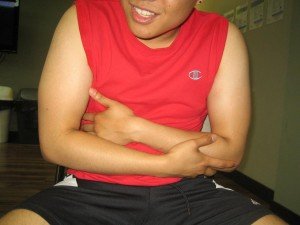Bloating is a sensation that the abdominal area is distended or tight. This is a usual feeling after eating a lot or eating foods that are difficult to digest but can also be caused by an allergic reaction to peanuts which is one of the most common food allergies. If an individual consistently experiences bloating after eating peanut butter, a doctor should be consulted in order to determine if an allergy or a digestive issue is responsible.
Close look on bloating
The distended or tight feeling linked with bloating can occur for various reasons that range from overeating to a serious digestive issue. Once the individual experiences bloating consistently after eating peanut butter, it is likely due to food intolerance or a food allergy. In some cases, the cause might be an underlying digestive issue such as irritable bowel syndrome. Consumption of peanut butter might simply worsen the symptoms of the disease.

Food issues
Food allergies are often mixed up as intolerance to certain foods, but they have different causes. When it comes to food intolerance, it is an issue with the digestion of a certain food that can lead to gas and bloating. As for food allergy, it is caused by the immune system. The body identifies a particular food as an allergen and marks it as a threat. This triggers the release of histamine and other chemicals that cause the symptoms of an allergy reaction that might include bloating. Peanuts are one of the common food allergens along with eggs, wheat, milk and shellfish. Unlike with intolerance, a food allergy can be life-threatening in severe cases.
What are the common symptoms?
The symptoms of food intolerance include mild digestive issues such as abdominal cramps, bloating, diarrhea and nausea which are mainly due to the accumulation of gas in the intestines.
As for food allergies, the symptoms are similar but often accompanied by the typical allergy symptoms such as hives, sneezing or itchiness around the mouth. The severe symptoms can include loss of breath, chest pain and closure of the throat.
In case a digestive issue is the culprit, bloating can occur after eating various foods and often accompanied by symptoms strikingly similar to food intolerance.
Management
Once bloating occurs in a consistent manner right after eating peanut butter, it is best to schedule an appointment with a doctor as soon as possible. The doctor can determine the underlying cause and recommend the suitable treatment.
Food intolerance often requires the individual to avoid the problem food. As for peanut allergy, the individual should avoid peanuts but this can be a difficult task since many food manufacturers frequently use peanuts in some products and not on others. This results to the presence of peanut residue in foods that are not supposed to contain peanuts at all.
The individual should also wear a medical alert bracelet or necklace and bring along an auto-injector epinephrine. This is prescribed by the doctor for those who are prone to severe reactions. It works by preventing the body to go into a state of shock. The digestive issues often require medications as well as modifications with the diet.
